CAD Salary Checker
Should you be expecting a raise? Have you got a job offer? Want to know if you’re underpaid?
2019 Employment Survey Results
Each year we ask our candidates 13 questions on their situation and general job satisfaction. Here are this years results.
WHAT PART OF THE
COUNTRY
DO YOU WORK?
As ever, the majority of respondents are still working in London, although this majority has dropped by 2% since the 2018 survey. The North West has jumped to a clear second place for the first time, although just over half of respondents are still working in the South of England, with only very small rises in Scotland, South Wales and Ireland.
Scotland
North East
North West
North Wales
South Wales
Midlands
South West
South East (Outside M25)
London (Inside M25)
Ireland
3.5%
7.1%
17.1%
0.7%
1.4%
16.3%
7.4%
15.7%
28.7%
2.1%


WHAT IS YOUR CURRENT SALARY?
Although recent years have witnessed a natural steady climb in salaries, the 2019 survey has seen a disappointing push back into lower salary brackets for the majority which is perhaps indicative of a lighter workload for many of you. While there has been little change in high-end workers earning over £40,000, the most popular bracket this year is £25,001 to £30,000, which is an alarming step back from last year when a clear majority of 22.7% of respondents were earning £30,001 to £35,000.
WHAT IS YOUR AGE?
We continue to see encouraging signs of growth in the youngest age bracket of 18-24. Just a couple of years ago, this had dropped to less than 1%, but is now back on an upwards trend and hitting 8.2% this year, suggesting that the industry is working harder on attracting and nurturing the next generation of talent, but there may still be a long way to go.
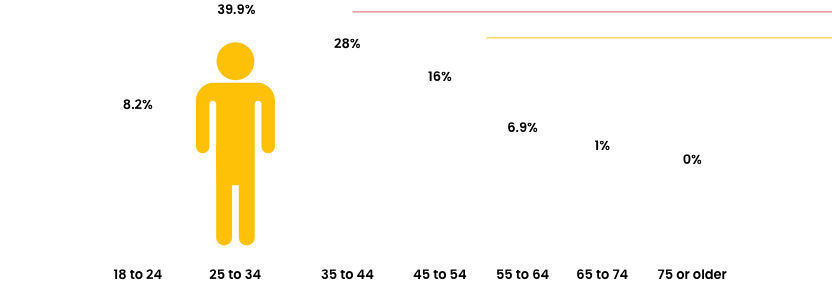
WHICH OF THE FOLLOWING BEST DESCRIBES YOUR CURRENT JOB LEVEL?


HOW APPRECIATED DO YOU FEEL IN YOUR CURRENT ROLE?
It’s good to see that a healthy majority of 36% of respondents feel ‘Quite Appreciated’ in their role, with an additional 28% feeling ‘Appreciated’, a climb of 5% from last year. There’s been a very slight decrease in the number of respondents feeling only ‘A Little Appreciated’ or not appreciated at all, but this is matched by a slight decrease in the numbers for ‘Very Appreciated’, suggesting that there’s still room for improvement.


HOW REWARDING IS YOUR CURRENT ROLE?
These figures also look healthy on the surface with over two-thirds of respondents reporting that their role feels either ‘Rewarding’ or ‘Quite Rewarding’. But looking at the opposite ends of the spectrum again reveals scope for improvement, particularly when compared to last year’s figures. Over 1% more of you are feeling this year that your role is not remotely rewarding, while there’s also been a corresponding 1% drop in the figures for ‘Very Rewarding’.
HOW REWARDING IS YOUR CURRENT ROLE?
A definite move to the middle ground this year, with ‘Moderate’ stress levels jumping up by 9% on last year and pushing ‘Too Much’ down to third place. The good news here is that while some degree of stress on deadlines is to be naturally expected in our sector, fewer of you are feeling overburdened by the strain.

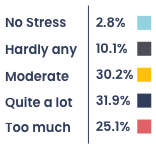
HOW LIKELY DO YOU FEEL PROGRESSION THROUGH MANAGEMENT LEVELS IS?

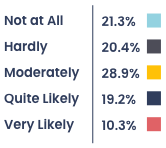
Although there’s very little change in the figures from last year, this itself indicates that there’s definite need for change in the mindset of employers to push open the doors to career progression. The fact that over 40% of respondents feel that they still have little or zero chance of progressing to management levels is a deeply worrying indicator of the current stagnation in clear and accessible opportunities within our industry.
WHAT ARE THE KEY MOTIVATORS FOR MAKING YOU CHANGE JOBS?
Unless we suddenly decide to abolish money, ‘Higher Salary’ is always going to be the clear winner in this category. It’s more interesting to observe the clear trends and growth patterns in the runner-up responses, a couple of which are increasing in popularity with every passing year. The biggest climber this year is ‘Better Working Environment’, up by nearly 7% on last year’s figure. And we continue to see the annual growth in respondents seeking ‘Flexible Working Hours’, now up to a record 58.2 % Forget the company cars and material perks. The employees of today are far more interested in developing a healthier lifestyle balance, and an improved environment in which to develop their craft.

WHAT SOFTWARE DO YOU USE IN YOUR CURRENT JOB?
It’s no surprise to see that AutoCAD is still the most popular software option here, but it’s down slightly on last year’s figures, along with a slight drop for SketchUp which has now been pushed into third place by SolidWorks. Revit has remained around 30% after a large jump in 2017. We see continued growth in all the other software packages, indicating that new options continue to be explored on an increasing level, but do we need to be stepping up the pace?

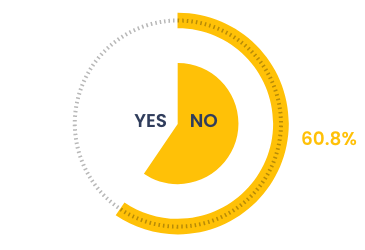
HAVE YOU BEEN OFFERED JOB RELATED TRAINING FOR THE SOFTWARE YOU ARE YOU USING?
Just a 2% rise in the number of respondents replying in the positive suggests that we still have progress to make in this area. Understandably, employers will be cautious about the expense and resources required to invest in the training and development of entirely fresh software options such as Revit. But now that BIM is a requirement on government projects, more and more employees should be getting to grips with the leading option for Building Information Modeling.
DO YOU THINK YOUR WORK WOULD BE MADE EASIER USING OTHER CAD SOFTWARE OPTIONS?
It’s interesting to observe that some employees possibly need to make the same jump in mindset and feel prepared to embrace new challenges in training. It’s true that some of the respondents who answered in the negative here may well already be up to speed with the software packages required for the projects of today and tomorrow. But when viewed alongside some of the figures above, it’s clear that many employees are happy to stick with AutoCAD and are not seriously considering other options which have the potential to unlock more doors.
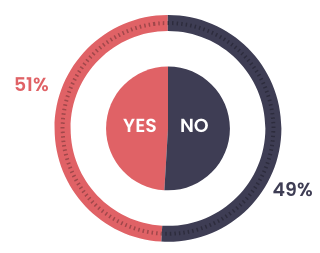

HAS BREXIT AFFECTED YOUR EMPLOYMENT OPTIONS?
While the looming prospect of Brexit appears to absorb the blame for bad news in many other sectors, it’s refreshing to see that a very healthy majority of respondents feel that Brexit has not impacted their employment options at all. However, there has been a 1% rise from last year in the number of respondents who feel that Brexit has made a difference. If we can believe the new government’s promise to actually “Get Brexit Done” in 2020, it will be intriguing to see the responses in this category in next year’s survey.
